高中英语北师大版模块3 Unit 8 Adventure Lesson 2 extreme sports 课件
文档属性
| 名称 | 高中英语北师大版模块3 Unit 8 Adventure Lesson 2 extreme sports 课件 |
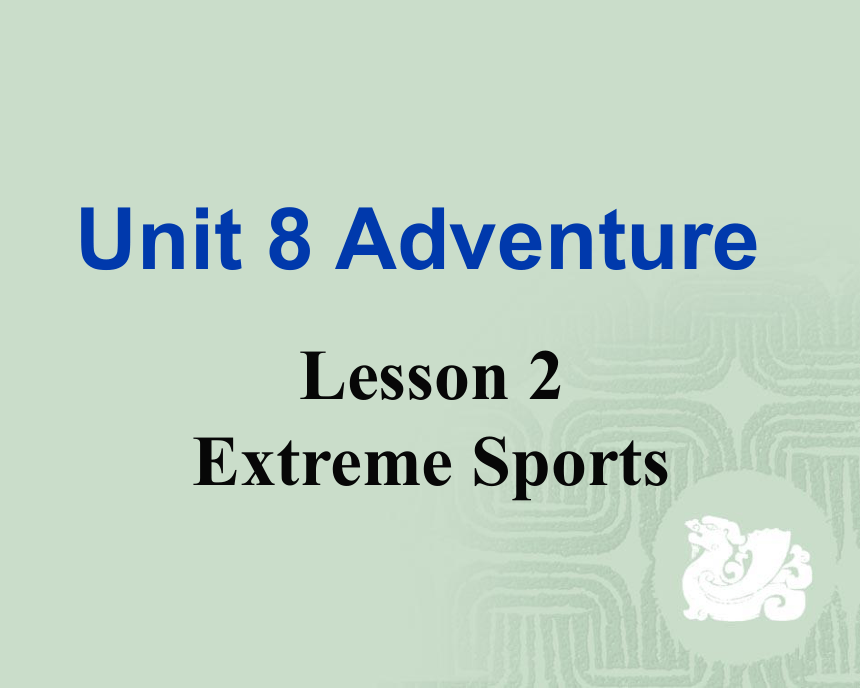
|
|
| 格式 | zip | ||
| 文件大小 | 599.9KB | ||
| 资源类型 | 教案 | ||
| 版本资源 | 北师大版 | ||
| 科目 | 英语 | ||
| 更新时间 | 2019-01-24 00:00:00 | ||
图片预览

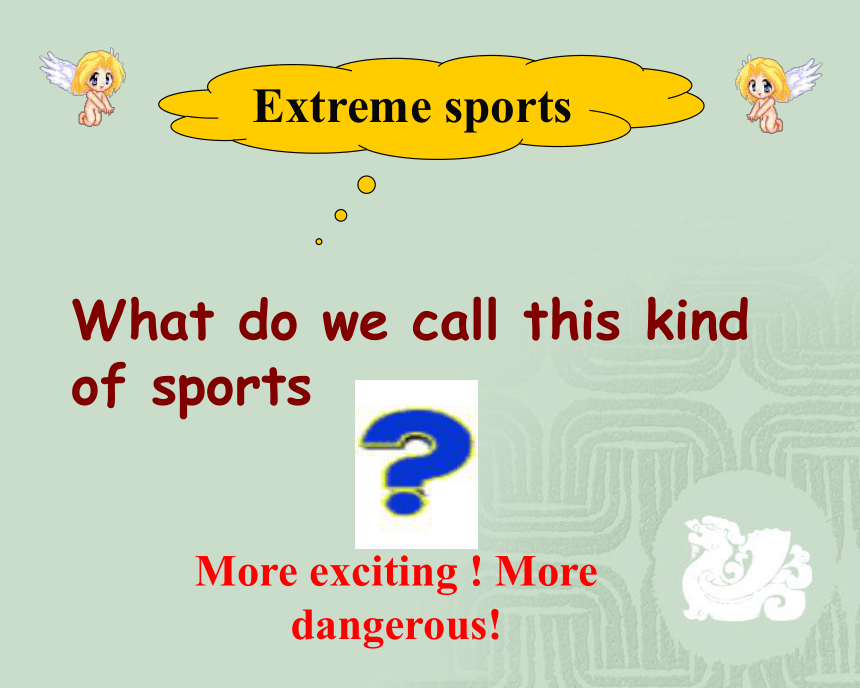
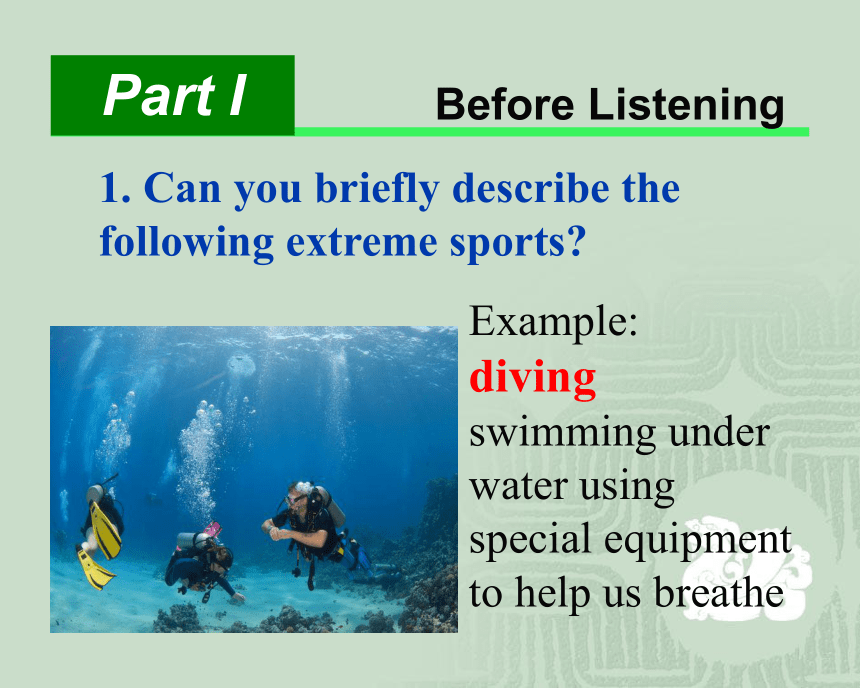
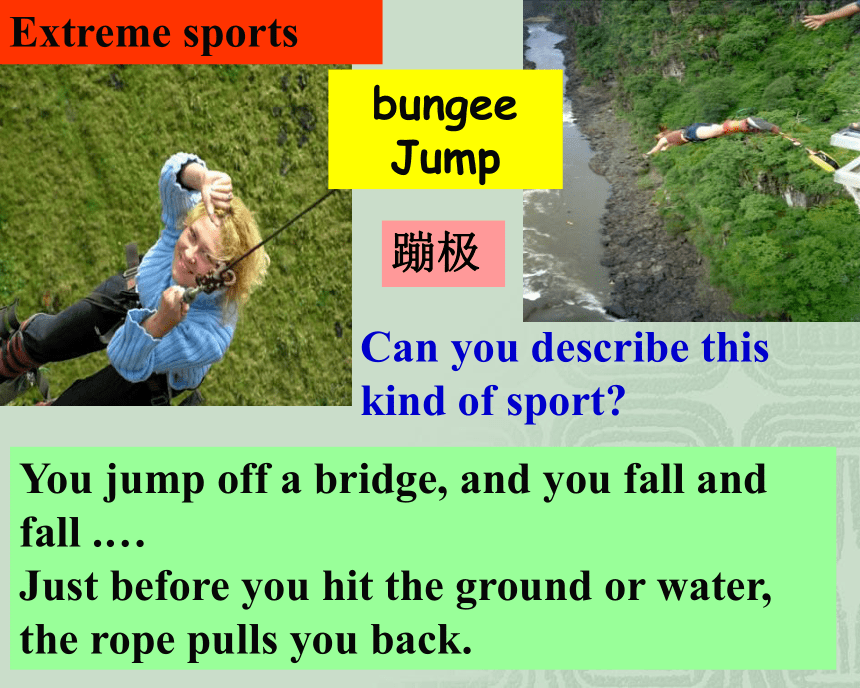
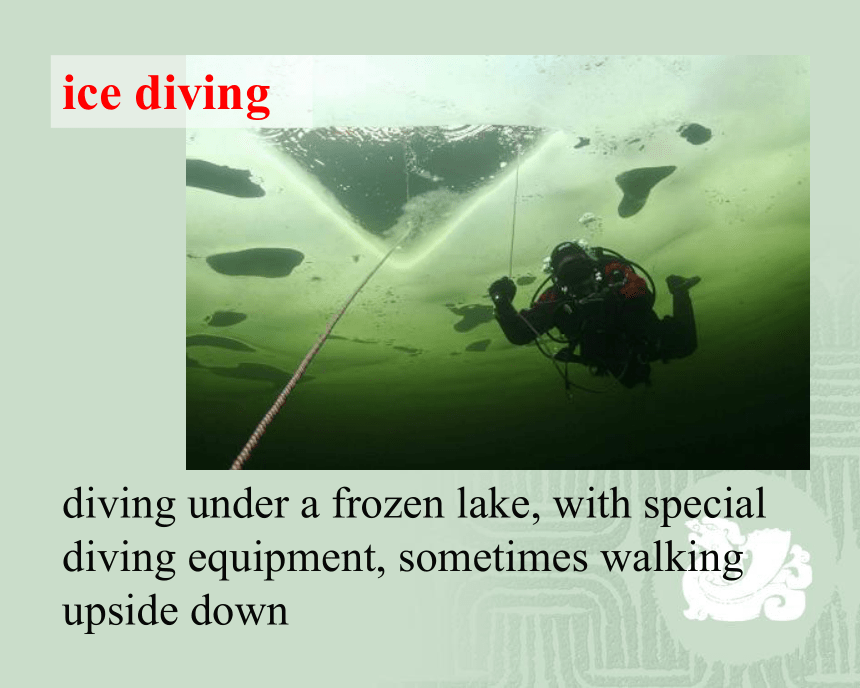
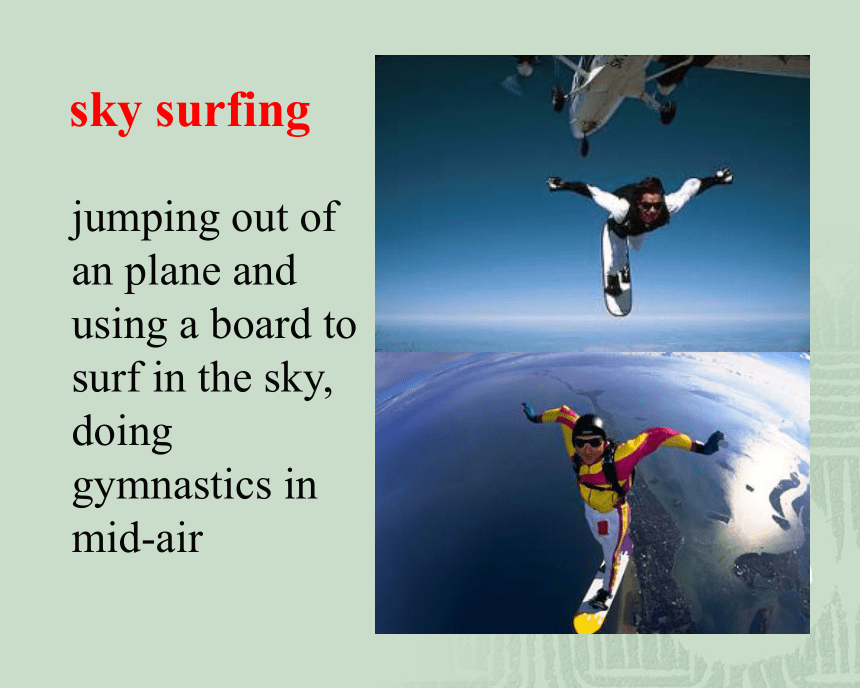
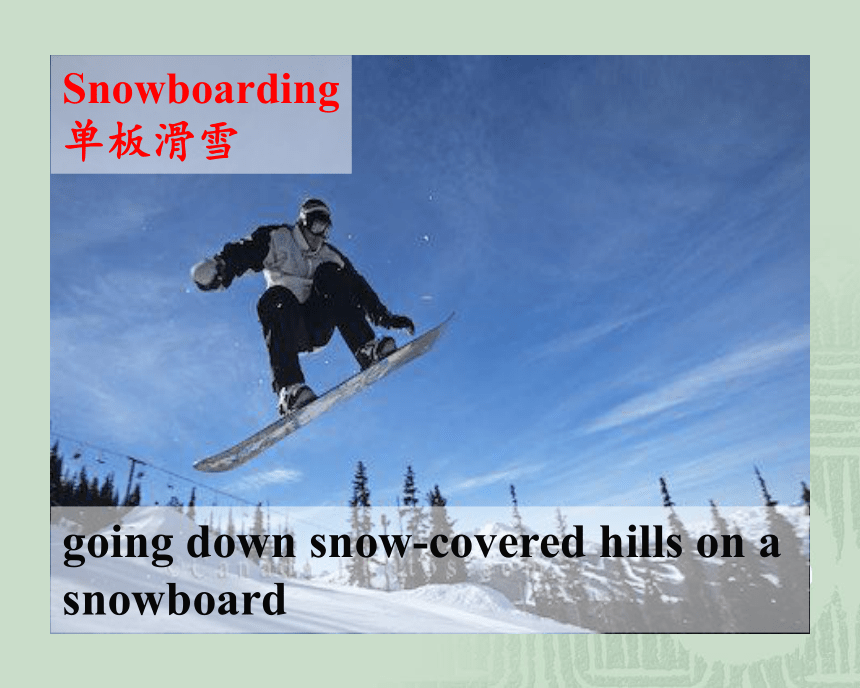
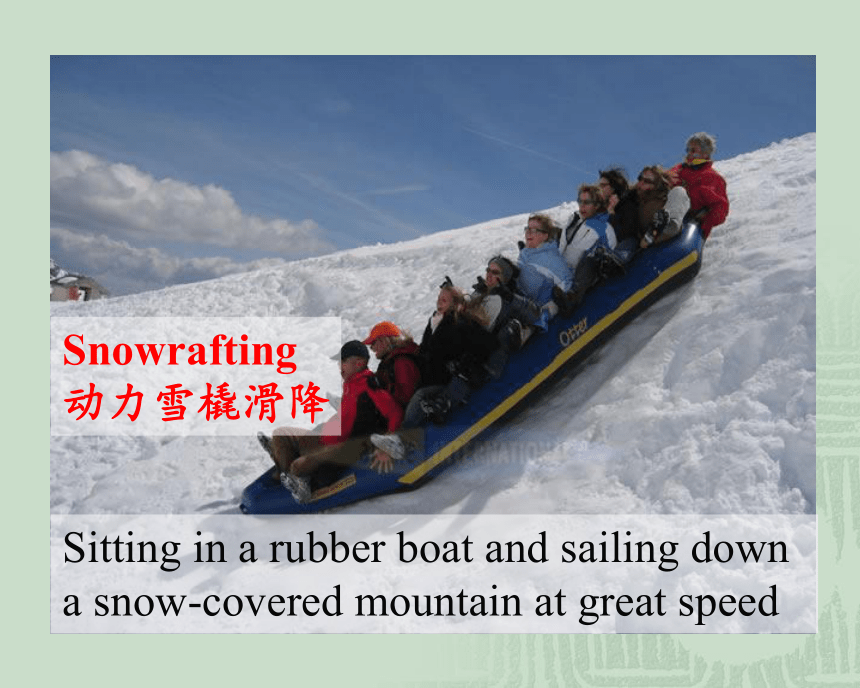
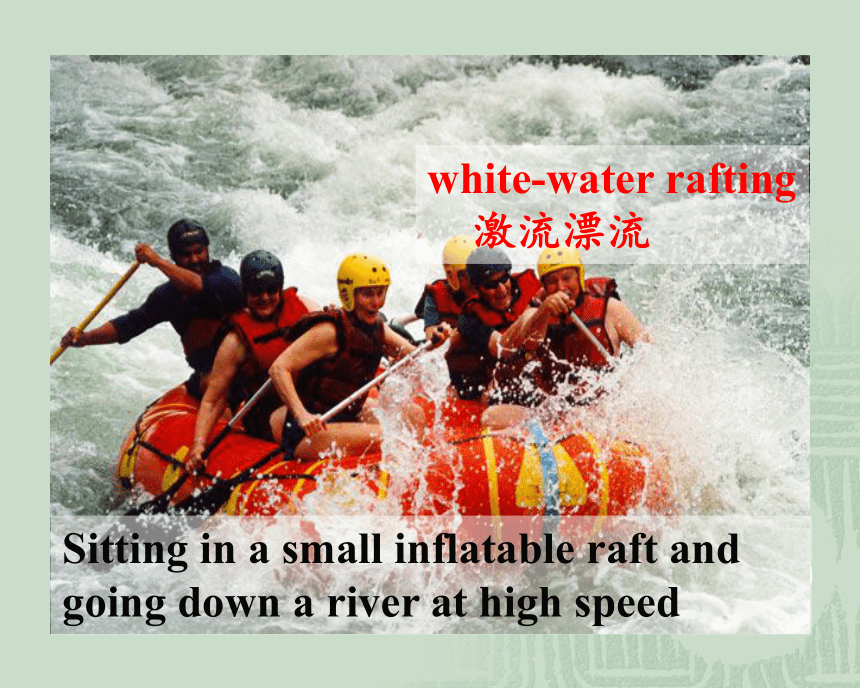
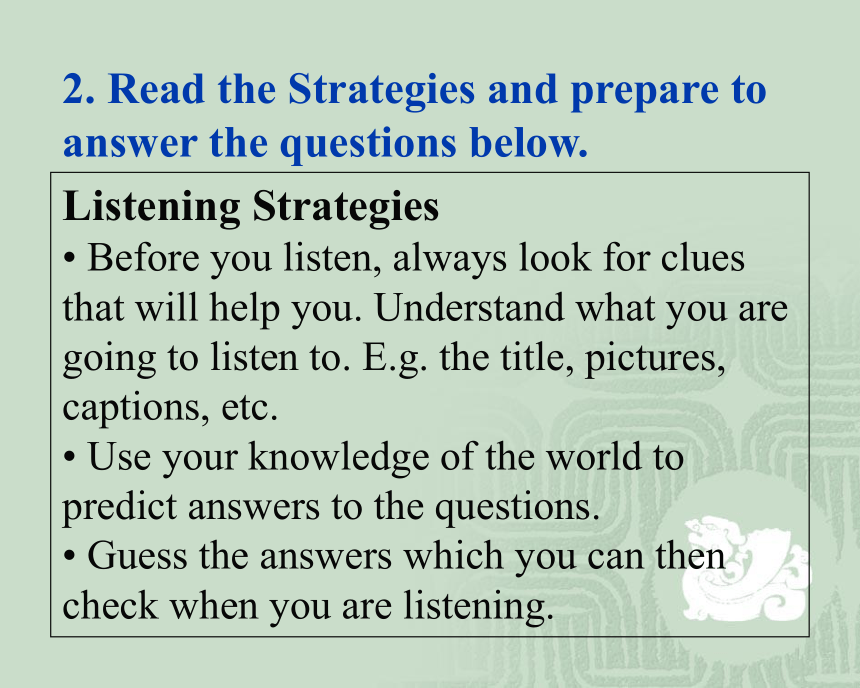
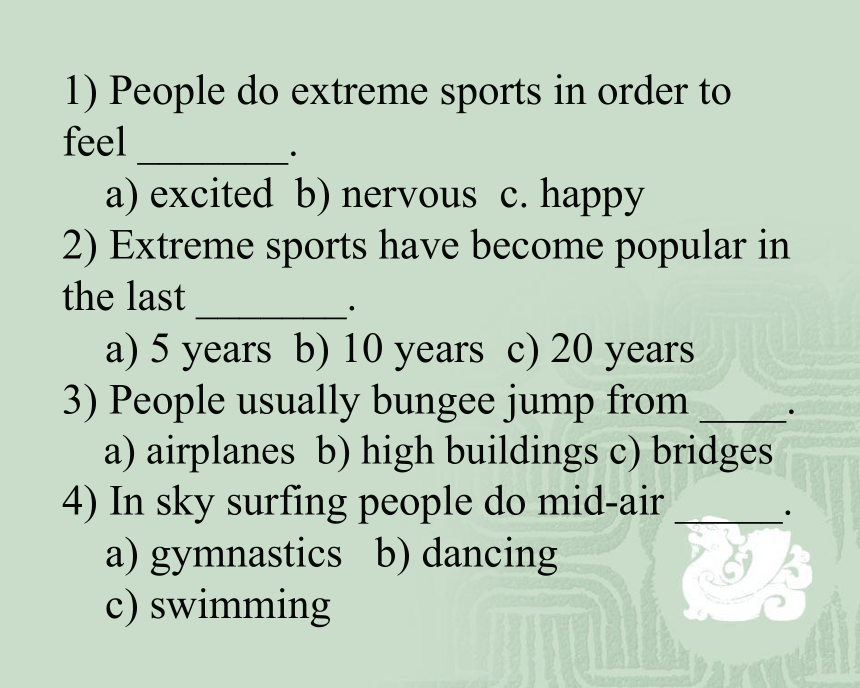
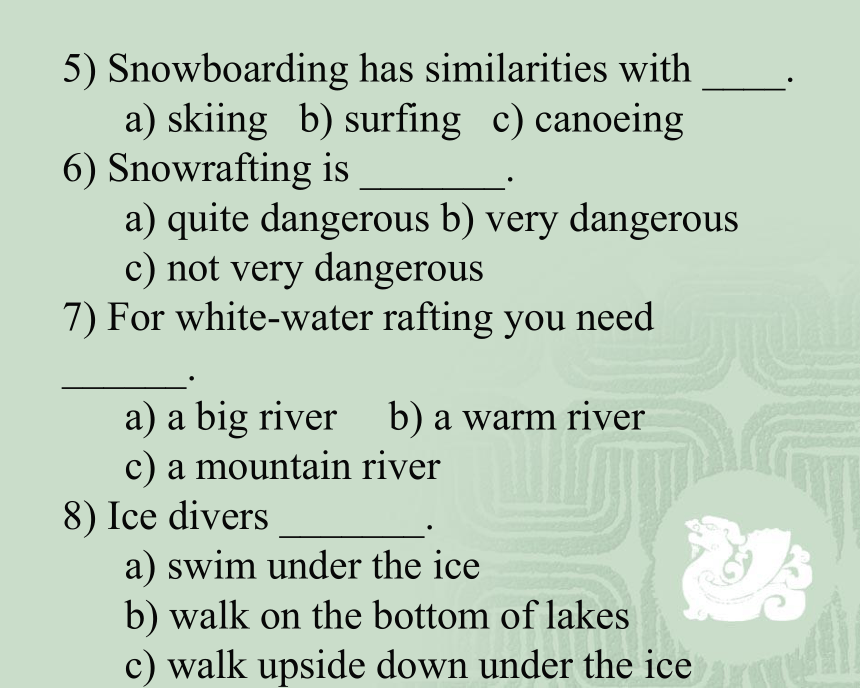
文档简介
(共34张PPT)
Unit 8 Adventure
Lesson 2
Extreme Sports
Extreme sports
What do we call this kind of sports
More exciting ! More dangerous!
Part I
Before Listening
1. Can you briefly describe the following extreme sports
Example:
diving
swimming under water using special equipment to help us breathe
蹦极
Can you describe this kind of sport
Extreme sports
You jump off a bridge, and you fall and fall .…
Just before you hit the ground or water, the rope pulls you back.
bungee Jump
diving under a frozen lake, with special diving equipment, sometimes walking upside down
ice diving
jumping out of an plane and using a board to surf in the sky, doing gymnastics in mid-air
sky surfing
going down snow-covered hills on a snowboard
Snowboarding
单板滑雪
Sitting in a rubber boat and sailing down a snow-covered mountain at great speed
Snowrafting
动力雪橇滑降
Sitting in a small inflatable raft and going down a river at high speed
white-water rafting
激流漂流
Listening Strategies
Before you listen, always look for clues that will help you. Understand what you are going to listen to. E.g. the title, pictures, captions, etc.
Use your knowledge of the world to predict answers to the questions.
Guess the answers which you can then check when you are listening.
2. Read the Strategies and prepare to answer the questions below.
1) People do extreme sports in order to feel _______.
a) excited b) nervous c. happy
2) Extreme sports have become popular in the last _______.
a) 5 years b) 10 years c) 20 years
3) People usually bungee jump from ____.
a) airplanes b) high buildings c) bridges
4) In sky surfing people do mid-air _____.
a) gymnastics b) dancing
c) swimming
5) Snowboarding has similarities with ____.
a) skiing b) surfing c) canoeing
6) Snowrafting is _______.
a) quite dangerous b) very dangerous
c) not very dangerous
7) For white-water rafting you need ______.
a) a big river b) a warm river
c) a mountain river
8) Ice divers _______.
a) swim under the ice
b) walk on the bottom of lakes
c) walk upside down under the ice
Part II
While Listening
1) People do extreme sports in order to feel
a) excited b) nervous c. happy
2) Extreme sports have become popular in the last _______.
a) 5 years b) 10 years c) 20 years
3) People usually bungee jump from _____.
a) airplanes b) high buildings c) bridges
Answers: 1)____ 2)____ 3)____
a
b
c
1. Listen and check your answers.
4) In sky surfing people do mid-air ____.
a) gymnastics b) dancing
c) swimming
5) Snowboarding has similarities with
a) skiing b) surfing c) canoeing
6) Snowrafting is _______.
a) quite dangerous
b) very dangerous
c) not very dangerous
Answers: 4)____ 5)____ 6)____
a
b
b
7) For white-water rafting you need ____.
a) a big river
b) a warm river
c) a mountain river
8) Ice divers _______.
a) swim under the ice
b) walk on the bottom of lakes
c) walk upside down under the ice
Answers: 7)____ 8)____
c
c
2. Listen to two people talking about extreme plete the table.
Sports Carol Jonathan
likes
doesn’t like tennis
would like to try
wouldn’t like to try bungee jumping
bungee jumping
skiing/ snowboarding
sailing
sky-surfing
ice diving
snowrafting
3. Listen again. Complete the Function File.
Preferences
+ing/ noun
I ______ bungee jumping.
I ______ doing boring sports.
I________ winter sports.
I _____ going skiing.
I ________snowboarding.
I __________ slow sports.
+ to+ infinitive
I ________ to try sky surfing.
I ___________ to do snowrafting.
I __________ to stay at home.
I ___________ to go ice diving.
like
hate
prefer
love
quite like
can’t stand
’d love
wouldn’t like
’d prefer
’d quite like
Part III
Vocabulary
Ex 7. Replace the verbs in italics with these words in their correct form.
not do it, organise, be interested in, arrive, wear, do (it) as planned, explain, start doing
I decided to take up ( ) bungee jumping and now I am really into it ( ). When I
start doing
am really interested in
turned up ( ) for my first jump I was so nervous that I tried to back out ( ), but my friends persuaded me to go through with it ( ). You don’t have to put on ( ) any special clothes, just a sweater and jeans, but obviously you need a lot of time to set up ( ) the equipment. But it’s worth waiting for. It’s difficult to get across ( ) how exciting it is!
arrived
not do it
do it as planned
wear
ogranise
explain
Ex 8. Complete the sentences with the phrasal verbs.
Ann waited for Tom for ages but he didn’t __________.
What kind of music _____ you _____
A friend of mine _____ just _________ jogging in order to get fit.
Why don’t we _________ our computer in the study
They were going to have a party last Saturday but ____________ at the last minute.
turn up
are into
has taken up
set up
backed out
Part IV
Pronunciation
Intonation in Questions
Ex 9. Listen to the questions below. In which of them does the intonation go up at the end
Sports Questionnaire
Part V
Speaking
Discuss in pairs and make up a dialogue about your preferences for sports. Pay attention to your intonation in questions and you may use the words and expressions you have learned in this
lesson.
The following expressions may help
you.
I like…, I’d love to …, I love…, I’d quite like…
2) I wouldn’t like…, I hate…, I can’t stand…, I’d prefer ...
Example
A: What sort of extreme sports do you do
B: I like/ love…
A: Really Why
B: …
A: What about other extreme sports
B: I…, but … you know.
A: Right. Are there any sports you wouldn’t like to try
B: Personally, I wouldn’t like / hate doing boring sports, like…. …
Part VI
Language Points
1. What makes people risk their lives to do them
[点拨]
risk作动词,意为“冒……的险”,常用
于短语risk one’s life to do sth (冒生命
危险做某事),risk doing sth (冒险做某
事)。如:
Don’t risk swimming across that river.
不要冒险游过那条河。
[拓展]
Risk 还可作名词,表示“冒险;风险”,常用搭配有:
at the risk of 冒……的险
take the risk of doing sth 冒险做某事
[即时演练]
完成句子:
(1) He ________________ (冒着生命危险) to save that child in the lake.
(2) You will be at _______________ (冒……的险) losing your job if you don’t work hard.
risked his life
the risk of
2. When I turned up for my first jump I was so nervous that I tried to back out, but my friends persuaded me to go through with it.
[点拨]
(1) turn up 在此处是不及物动词词组,表示“出现;到场”。又如:
We had made an appointment to dinner together, but he didn’t turn up at all.
我们约好了一起吃饭,但是他根本没来。
(2) back out表示“退出;取消”等,常与of连用。又如:
She decided to back out of the project at the last moment.
她在最后时刻决定退出那项计划。
[拓展]
(1) turn up 还可作及物动词词组,表示“把音量调大;卷起”等。
(2) 包含turn的常用词组还有:
turn down 把音量调低;拒绝
turn off 关掉(电源、煤气等)
turn on 打开(电源、煤气等)
turn over 翻身;翻转
[即时演练] 完成句子:
(1) — Why is he so sad
— He was ____________ when he asked a girl out yesterday.
(2) Remember to _____________ all the lights when you leave.
(3) The project has already been carried out. It is not possible for anyone to ___________ now.
(4) You’d better _________ five minutes early before the meeting begins.
(5) After finishing his homework, he ________ the TV.
turned down
turn off
back out
turn up
turned on
3. It’s difficult to get across how exciting it is!
[点拨] get across在此处是及物动词词组,表示“使……被理解”,常与to连用。又如:
It is hard to get my idea across to her.
很难让她理解我的想法。
[拓展]
(1) get across还可表示“穿过;越过”。
(2) 包含get 的常用短语还有:
get on 进展(顺利)
get off 动身;出发
get through 顺利通过
完成句子:
(1) With his help, I’ve ____________ all the exams.
(2) I think this is the point he wants to ___________.
(3) Don’t worry. Everything is ____________ well.
got through
get across
getting on
[即时演练]
30期报纸B版基础知识小测Lesson2(交)
30期报纸A版单选和完型填空
Homework
Unit 8 Adventure
Lesson 2
Extreme Sports
Extreme sports
What do we call this kind of sports
More exciting ! More dangerous!
Part I
Before Listening
1. Can you briefly describe the following extreme sports
Example:
diving
swimming under water using special equipment to help us breathe
蹦极
Can you describe this kind of sport
Extreme sports
You jump off a bridge, and you fall and fall .…
Just before you hit the ground or water, the rope pulls you back.
bungee Jump
diving under a frozen lake, with special diving equipment, sometimes walking upside down
ice diving
jumping out of an plane and using a board to surf in the sky, doing gymnastics in mid-air
sky surfing
going down snow-covered hills on a snowboard
Snowboarding
单板滑雪
Sitting in a rubber boat and sailing down a snow-covered mountain at great speed
Snowrafting
动力雪橇滑降
Sitting in a small inflatable raft and going down a river at high speed
white-water rafting
激流漂流
Listening Strategies
Before you listen, always look for clues that will help you. Understand what you are going to listen to. E.g. the title, pictures, captions, etc.
Use your knowledge of the world to predict answers to the questions.
Guess the answers which you can then check when you are listening.
2. Read the Strategies and prepare to answer the questions below.
1) People do extreme sports in order to feel _______.
a) excited b) nervous c. happy
2) Extreme sports have become popular in the last _______.
a) 5 years b) 10 years c) 20 years
3) People usually bungee jump from ____.
a) airplanes b) high buildings c) bridges
4) In sky surfing people do mid-air _____.
a) gymnastics b) dancing
c) swimming
5) Snowboarding has similarities with ____.
a) skiing b) surfing c) canoeing
6) Snowrafting is _______.
a) quite dangerous b) very dangerous
c) not very dangerous
7) For white-water rafting you need ______.
a) a big river b) a warm river
c) a mountain river
8) Ice divers _______.
a) swim under the ice
b) walk on the bottom of lakes
c) walk upside down under the ice
Part II
While Listening
1) People do extreme sports in order to feel
a) excited b) nervous c. happy
2) Extreme sports have become popular in the last _______.
a) 5 years b) 10 years c) 20 years
3) People usually bungee jump from _____.
a) airplanes b) high buildings c) bridges
Answers: 1)____ 2)____ 3)____
a
b
c
1. Listen and check your answers.
4) In sky surfing people do mid-air ____.
a) gymnastics b) dancing
c) swimming
5) Snowboarding has similarities with
a) skiing b) surfing c) canoeing
6) Snowrafting is _______.
a) quite dangerous
b) very dangerous
c) not very dangerous
Answers: 4)____ 5)____ 6)____
a
b
b
7) For white-water rafting you need ____.
a) a big river
b) a warm river
c) a mountain river
8) Ice divers _______.
a) swim under the ice
b) walk on the bottom of lakes
c) walk upside down under the ice
Answers: 7)____ 8)____
c
c
2. Listen to two people talking about extreme plete the table.
Sports Carol Jonathan
likes
doesn’t like tennis
would like to try
wouldn’t like to try bungee jumping
bungee jumping
skiing/ snowboarding
sailing
sky-surfing
ice diving
snowrafting
3. Listen again. Complete the Function File.
Preferences
+ing/ noun
I ______ bungee jumping.
I ______ doing boring sports.
I________ winter sports.
I _____ going skiing.
I ________snowboarding.
I __________ slow sports.
+ to+ infinitive
I ________ to try sky surfing.
I ___________ to do snowrafting.
I __________ to stay at home.
I ___________ to go ice diving.
like
hate
prefer
love
quite like
can’t stand
’d love
wouldn’t like
’d prefer
’d quite like
Part III
Vocabulary
Ex 7. Replace the verbs in italics with these words in their correct form.
not do it, organise, be interested in, arrive, wear, do (it) as planned, explain, start doing
I decided to take up ( ) bungee jumping and now I am really into it ( ). When I
start doing
am really interested in
turned up ( ) for my first jump I was so nervous that I tried to back out ( ), but my friends persuaded me to go through with it ( ). You don’t have to put on ( ) any special clothes, just a sweater and jeans, but obviously you need a lot of time to set up ( ) the equipment. But it’s worth waiting for. It’s difficult to get across ( ) how exciting it is!
arrived
not do it
do it as planned
wear
ogranise
explain
Ex 8. Complete the sentences with the phrasal verbs.
Ann waited for Tom for ages but he didn’t __________.
What kind of music _____ you _____
A friend of mine _____ just _________ jogging in order to get fit.
Why don’t we _________ our computer in the study
They were going to have a party last Saturday but ____________ at the last minute.
turn up
are into
has taken up
set up
backed out
Part IV
Pronunciation
Intonation in Questions
Ex 9. Listen to the questions below. In which of them does the intonation go up at the end
Sports Questionnaire
Part V
Speaking
Discuss in pairs and make up a dialogue about your preferences for sports. Pay attention to your intonation in questions and you may use the words and expressions you have learned in this
lesson.
The following expressions may help
you.
I like…, I’d love to …, I love…, I’d quite like…
2) I wouldn’t like…, I hate…, I can’t stand…, I’d prefer ...
Example
A: What sort of extreme sports do you do
B: I like/ love…
A: Really Why
B: …
A: What about other extreme sports
B: I…, but … you know.
A: Right. Are there any sports you wouldn’t like to try
B: Personally, I wouldn’t like / hate doing boring sports, like…. …
Part VI
Language Points
1. What makes people risk their lives to do them
[点拨]
risk作动词,意为“冒……的险”,常用
于短语risk one’s life to do sth (冒生命
危险做某事),risk doing sth (冒险做某
事)。如:
Don’t risk swimming across that river.
不要冒险游过那条河。
[拓展]
Risk 还可作名词,表示“冒险;风险”,常用搭配有:
at the risk of 冒……的险
take the risk of doing sth 冒险做某事
[即时演练]
完成句子:
(1) He ________________ (冒着生命危险) to save that child in the lake.
(2) You will be at _______________ (冒……的险) losing your job if you don’t work hard.
risked his life
the risk of
2. When I turned up for my first jump I was so nervous that I tried to back out, but my friends persuaded me to go through with it.
[点拨]
(1) turn up 在此处是不及物动词词组,表示“出现;到场”。又如:
We had made an appointment to dinner together, but he didn’t turn up at all.
我们约好了一起吃饭,但是他根本没来。
(2) back out表示“退出;取消”等,常与of连用。又如:
She decided to back out of the project at the last moment.
她在最后时刻决定退出那项计划。
[拓展]
(1) turn up 还可作及物动词词组,表示“把音量调大;卷起”等。
(2) 包含turn的常用词组还有:
turn down 把音量调低;拒绝
turn off 关掉(电源、煤气等)
turn on 打开(电源、煤气等)
turn over 翻身;翻转
[即时演练] 完成句子:
(1) — Why is he so sad
— He was ____________ when he asked a girl out yesterday.
(2) Remember to _____________ all the lights when you leave.
(3) The project has already been carried out. It is not possible for anyone to ___________ now.
(4) You’d better _________ five minutes early before the meeting begins.
(5) After finishing his homework, he ________ the TV.
turned down
turn off
back out
turn up
turned on
3. It’s difficult to get across how exciting it is!
[点拨] get across在此处是及物动词词组,表示“使……被理解”,常与to连用。又如:
It is hard to get my idea across to her.
很难让她理解我的想法。
[拓展]
(1) get across还可表示“穿过;越过”。
(2) 包含get 的常用短语还有:
get on 进展(顺利)
get off 动身;出发
get through 顺利通过
完成句子:
(1) With his help, I’ve ____________ all the exams.
(2) I think this is the point he wants to ___________.
(3) Don’t worry. Everything is ____________ well.
got through
get across
getting on
[即时演练]
30期报纸B版基础知识小测Lesson2(交)
30期报纸A版单选和完型填空
Homework
